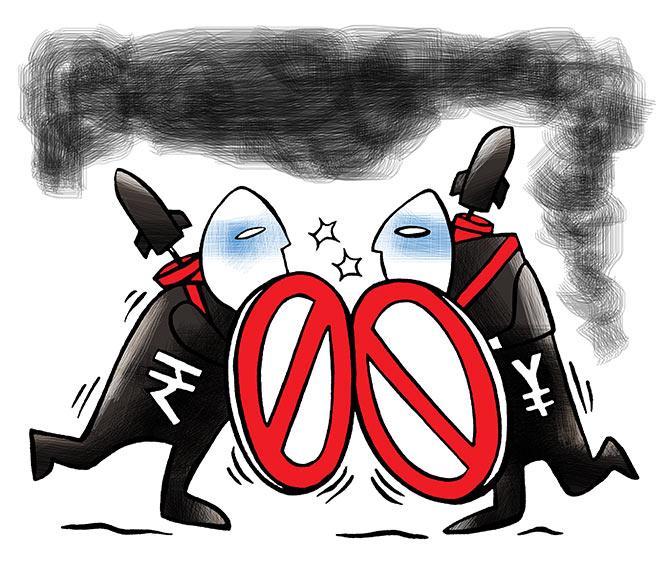India has no option but to shut China out, notes T C A Srinivasa-Raghavan.
Illustration: Uttam Ghosh/Rediff.com

Sceptics are raising doubts about India's ability to reduce trade with China.
But they should keep in mind that all major crises leave behind an overarching legacy.
This virus thing isn't going to be an exception.
It is the equivalent, simultaneously, of a heart attack, a stroke, and a devastating war.
And it's going to set the clock back almost to 1920.
The sheer destructiveness of the 1914-1918 war made it necessary to trap domestic savings and output within national and/or empire borders to provide employment.
That happened in 1920 -- which is exactly where the world is today.
So within the next three years or so we are likely to see a massive reversal of the economic openness that was fostered after the end of the Second World War in 1945.
This will happen because employment is no longer just an economic outcome.
It has become the most important political objective.
The technical aspects of the post-1945 openness were engineered by the greatest economist of the 20th century, John Maynard Keynes, an Englishman, and an American bureaucrat who, it later turned out, was a Soviet spy.
No one knows why he did what he did. His name was Harry Dexter White.
The political objective was to contain Communism.
Keynes had provided the intellectual tool for it in 1936 by saying governments must intervene fiscally vigorously in economic activity to shore it up during periods of high unemployment.
White then provided the financial tools for it by creating two global banks of last resort, the International Bank for Reconstruction and Development and the IMF.
The third leg on which this arrangement stood was trade openness, for which the GATT was created.
Progress was slow as long as the Soviet Union was alive and provided an alternative path.
But after its death in 1991, and till 2016, the world became as open as it had been in 1914 to money and goods but not labour.
To recover, especially in the presence of a rogue country like the People's Republic of China, it's this openness that will end.
It has to, if other countries have to maximise their employment.
Indeed, if it was openness that led to the demise of the Soviet Union, its reversal is what will lead the demise of the PRC. It's inevitable.
Batten down
Although the old-fashioned will bleat in protest, doing this won't be hard.
In fact, quite the opposite as it will create domestic employment if imports from China are replaced.
The other closure will be financial because the monetary fluff the US created after 1985 is not sustainable.
It has led to too much debt, which means a financial collapse that makes the 2008 one look like a hiccup.
Only a trigger is needed.
This will again lead to a 1920-like need to trap domestic savings within national boundaries.
So prepare to say goodbye to capital account convertibility.
This process is an inevitability because now closedness is a basic need of domestic politics.
It's the exact opposite of the domestic political need of China -- openness.
China withers if the vine of openness, on which it has prospered, is cut off.
One thing needs to be added in this context and I would like to be the first to point it out: China is as subject to Triffin's Dilemma as the US has been.
This is that a country can't provide the reserve currency to the world and yet run a current account surplus.
China has to choose one of these two options -- reserve currency status for the renminbi or current account deficits.
The latter will be disastrous for it. It's screwed either way.
Indian options
India has no option but to shut China out.
That's not in doubt.
It's already started to do so. But the exact pacing of the shutout is important. It has to be properly calibrated.
I think in about a year, say, by July 1, 2021, the aim should be to halve imports from China.
The award of projects to it should be entirely stopped.
This will not be easy.
Reverting to the mean never is because for a while everyone loses something. But the alternative is to lose everything because that's how China wants to play the game.
And that's why we have to keep the focus. We need to restore flexible markets. That's what China has -- inflexible politics and flexible economics.
We have the opposite. That's why we are where we are and China is where it is.
China will not liberalise politically. But we can economically.
Feature Presentation: Aslam Hunani/Rediff.com











